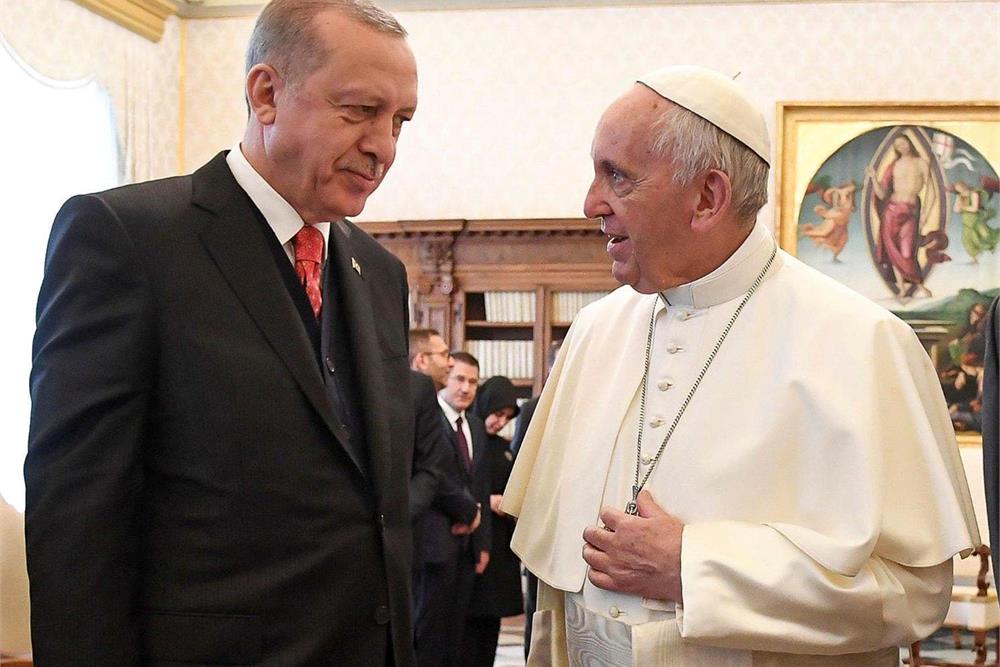Amid dialogue and controversy, Sultan Erdogan welcomes the fifth pope to visit Turkey
After Paul VI, John Paul II, Benedict XVI, and Francis, Leo XIV is now visiting the country on his first apostolic trip abroad. From the post-Regensburg controversy to the attacks over the Armenian genocide, the Turkish leader and his predecessors have had a sometimes troubled relationship with Roman pontiffs. For Fr Monge, the type of unity proposed by Pope Leo XIV is an expression of diversity reconciled by the Holy Spirit.
Istanbul (AsiaNews) – Leo XIV is the third pontiff after Francis and Benedict XVI to meet President Recep Tayyip Erdoğan who has had a chequered relationship with Roman pontiffs.
The Turkish leader took strong issue with Pope Francis's condemnation of the Armenian genocide and the controversy caused by Joseph Ratzinger's speech at the University of Regensburg, which was harshly criticised in some quarters of the Islamic world.
For the Argentine Pope, a visit to Turkey for the 1,700th anniversary of the First Council of Nicaea became an unfulfilled dream when he passed away. He had already visited the country in 2014, a year after he ascended to the petrine throne.
Since it straddles Europe and Asia, Turkey acts as an essential crossroads of encounter and dialogue, especially now at a crucial yet complicated time in the history of the Middle East.
Despite some difficult moments, the century-old relations between Turkey and the Holy See (diplomatic relations date back to 1868 with the former Ottoman Empire) have been marked by friendliness. Four pontiffs before Leo XIV have visited the country.
Paul VI came in 1967, during which he commemorated his historic 1964 meeting with the Greek Orthodox Patriarch Athenagoras I, as well as members of the Armenian, Muslim, and Jewish communities.
John Paul II visited in November 1979, while his successor, Benedict XVI, made an apostolic journey in 2006, including a historic visit to the famous Blue Mosque, becoming the second pontiff to enter the Islamic place of worship.
Regarding the relationship between the incumbent Turkish president and Roman pontiffs, one can mention the bitter clash with Francis over the pope's use of the term "genocide" in connection with the mass killing of Armenians (and Chaldeans) in 1915 by the former Ottoman Empire.
The Argentine pontiff was the first to openly use the word genocide, triggering a harsh reaction from Turkey's top political and religious leaders, who have always been sensitive in the matter.
In fact, while the Turkish leader expressed his country's "condolences" for the violence against the Armenians, he has always rejected the term genocide to describe the events that took place during the First World War.
Benedict XVI's trip in November 2006 is remembered for his historic visit to the Blue Mosque, the second pope in office to enter a Muslim place of worship, and part of efforts to boost Muslim-Christian relations.
However, the echoes of German pontiff’s speech at the University of Regensburg, Germany, almost three months earlier, which sparked a major controversy after it was more or less consciously distorted, cast a shadow over the visit from the moment of his arrival, with more than 25,000 Turkish nationalists taking to the streets in protest in the capital.
Then-Prime Minister Erdoğan exploited the issue for a time for domestic consumption to gain support among Islamists and conservatives, which was compounded by another element of controversy between “pontiff and sultan”, namely the row over Benedict XVI's alleged opposition to Turkey's accession to the European Union.
Dominican Father Claudio Monge, who has been in the country for 24 years where he serves as the director of DOST-I, the Dominican Study Institute Istanbul (dost means close friend in Turkish), also spoke about Leo XIV's apostolic journey to Turkey (and Lebanon), on Taccuino Celeste, the Mondo e Missione podcast.
In it, the priest stressed that in his first visit abroad, the pontiff was not simply "fulfilling a wish of his own predecessor," Francis. On the contrary, Leo is putting a "clear personal mark" by combining "the memory of the ancient faith of Nicaea with a very concrete objective," that of "strengthening synodal dialogue between the Churches."
"The unity he seeks," the priest noted, "is not an imposed uniformity" in the style of the Pax Constantiniana, but an "expression of diversity reconciled by the Holy Spirit."
According to Father Monge, “to overcome identity barriers, we must return to the heart of the Christian mystery and stop dwelling on a somewhat nostalgic memory of the past."
In Istanbul, he said, Pope Leo "will meet not only with Patriarch Bartholomew, but also with the leaders of the other Eastern Churches for moments of common prayer. And with the decision to unite Turkey and Lebanon in a single journey," he restores to the Mediterranean Sea "a central role, that of the spiritual and human heart of a Europe in difficulty, struggling to rediscover its ancient vocation."
"Finally,” the priest explained, “faced with war in the Middle East, migration, and the climate crisis, the Holy Father renews the appeal he made on the day of his election, which today becomes an even more heartfelt cry. It is time to disarm hearts.”
07/10/2025 18:04







.png)










